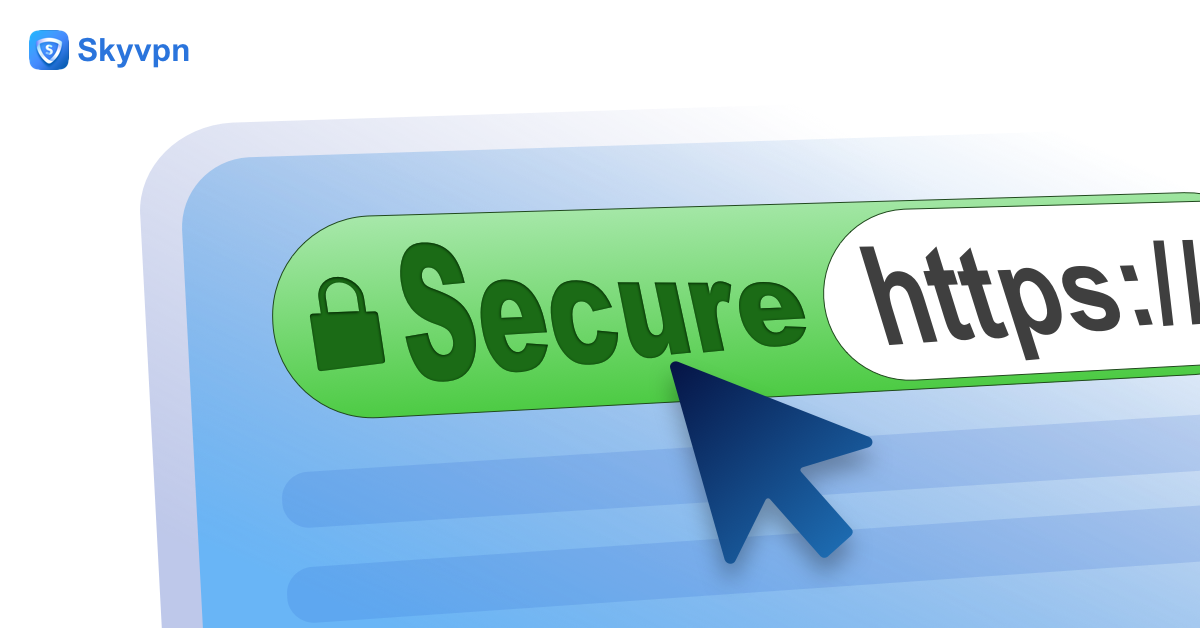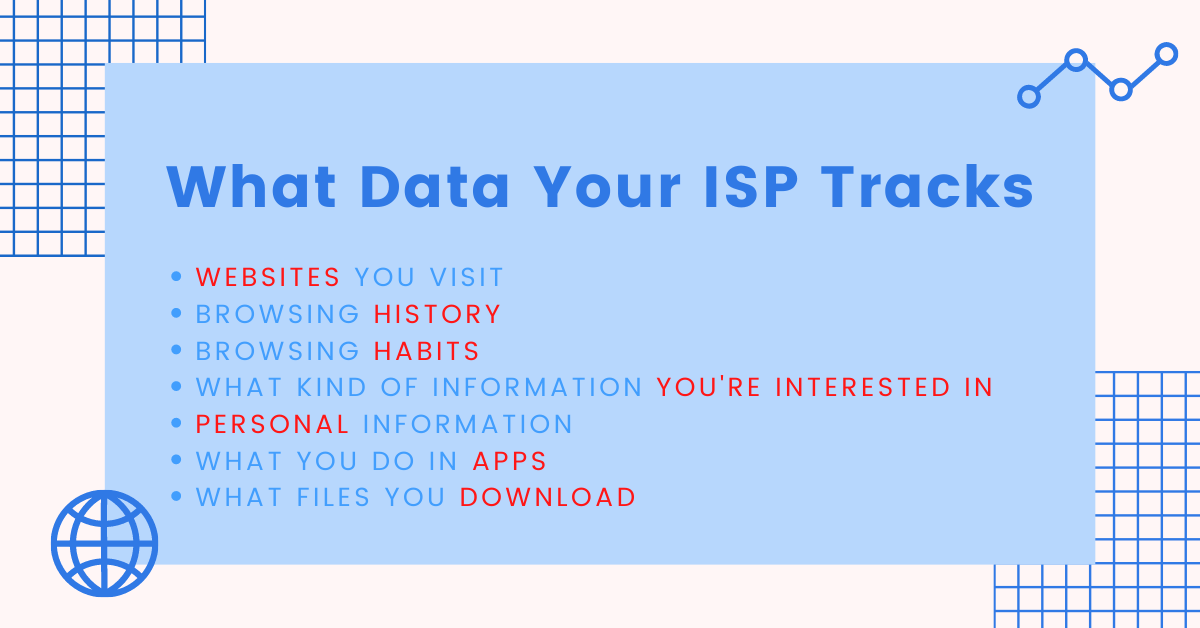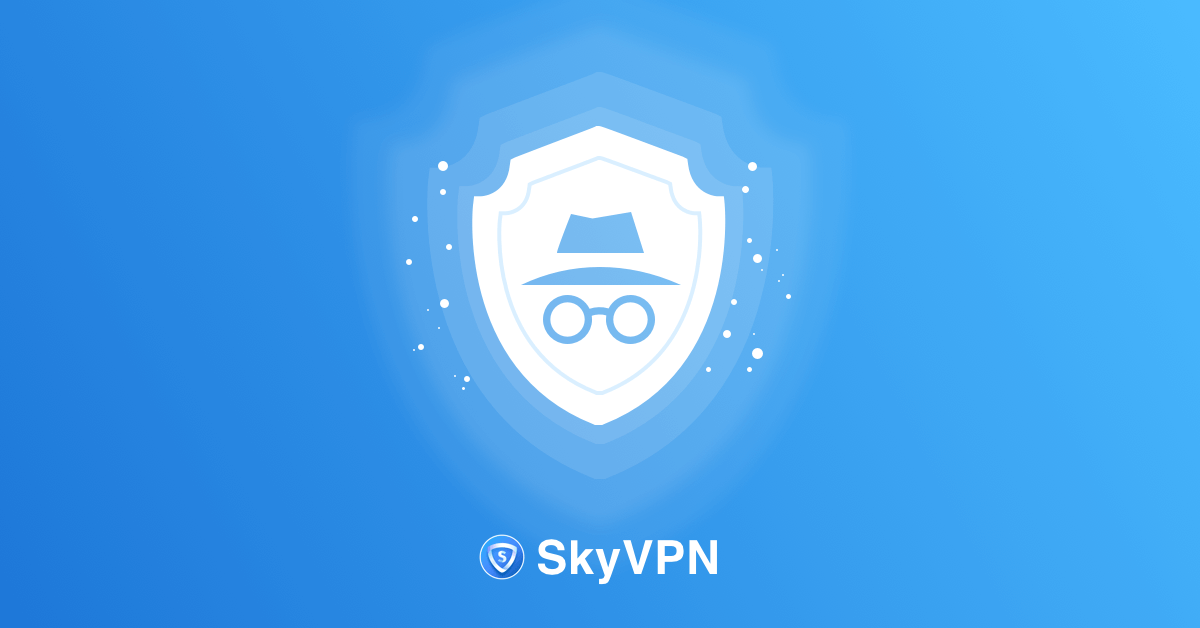
As you surf the Internet for streaming, gaming, shopping or even just searching for which restaurant has the best pizza near your house, do you know all your online activities can be possibly tracked by your Internet Service Provider (ISP)? It sounds scary, but unfortunately, it’s true.
Who is ISP and What is ISP Tracking?
Who is ISP? ISP, also called Internet Service Provider or Internet Provider, is an organization providing users with service of allowing them to visit, use and participate on the Internet. No one can use the Internet unless the Internet service plan is purchased from ISP.
ISP tracking refers to the fact that your online connections and activities are recorded by your Internet provider, which means all your “reactions” to the Internet, from searching history to email conversations, from streaming to gaming, from browsing to shopping, are monitored and logged by your ISP. No matter what device you’re using, PC, laptop, phone, tablet, TV, or game console, as long as they are linked to the Internet, all the data will be tracked by your ISP. The information like what sites you visit, what you download from the Internet, what you do in social media apps, and what you’ve bought online is all within the reach of your Internet provider.
Why Your ISP Keeps Tracking You?
Although ISP does track your online data, it isn’t true that your ISP keeps constantly watching your every move and click on the Internet while sitting in a dark room.
Basically, your ISP tracks your online activities and data “unintentionally”.
Log Data
In many parts of the world, laws are created to require ISPs to log their users’ online data so that the government’s security agency is able to acquire the information that is needed. The local laws or regulations allow the local government to have access to the Internet users’ online data like what websites they visit, what they do in apps, what resources they download from the Internet, etc. That’s especially important when it comes to crime or terrorism fighting. However, the other side of the coin is that all visitors online have to be “naked” online.
Still, remember Edward Snowden? He exposed that world people are monitored by governments based on the information provided by their ISPs.
Bandwidth Limit
Not always, but it can’t be denied that some ISPs limit users’ bandwidth to control the Internet traffic to keep an overall balance. It’s possible that ISPs claim that limiting bandwidth aims to reduce network traffic overloading and provide better service. However, their real purpose is to lead users to upgrade their service plan with higher cost.
As a result, as you stream Netflix, Hulu, or HBO, your ISP will instantly know that because huge bandwidth is consumed, which is too difficult to be seen. Is it reasonable to sacrifice your rights to the so-called “better service” claimed by your Internet provider? Definitely NO.
P2P Monitoring
File sharing is illegal in some countries. ISPs are responsible for monitoring their users to stop them against copyright infringement in the places where copyright laws and regulations should be strictly conformed to. To timely know whether you’re torrenting or not, your Internet provider needs to know what you download from the Internet and what sites you visit.
Once a user is found to be torrenting, a warning will be immediately released by ISP. The good result might be that your ISP passes the information to copyright agency and you’ll receive lots of notices. The bad result, however, you may be fined or sued.
Although torrenting isn’t encouraged, it’s still the only way for some people to acquire some files that are called for by their job or learning.
Selling Data for Profit
It isn’t expected, but it does occur.
Because all your online data and browsing activities are available in ISP’s hands, it possibly occurs that your ISPs sell your data to advertisers, marketers, or even hackers for profits. They hold the data in their hands, and they can deal with your data at will without your knowledge.
The data your Internet provider possibly sells include your browsing activities, browsing habits, your personal information, the web pages or websites you’d like to visit, what kind of information you’re interested in, what sites you visit, what you do in apps, and what files you download, etc.

Based on What, How Can Your ISP Track You?
The essential reason why your ISP can track you on the Internet is totally based on your IP address. And it’s impossible to stop an Internet provider from knowing your IP address because your IP address is assigned by your ISP.
Your IP address tells everything about you, including your geological position, your name, the device you’re using to browse, all the communications with the Internet, and even your credit card number, telephone number, etc. if your IP address, unfortunately, falls into an advanced hacker.
It can be understood that your ISP knows everything about you whenever your IP address is known. That’s also why you can never avoid your Internet provider from tracking you since it holds your IP address in the hand.
Therefore, it seems impossible to hide your online history from ISP unless your IP address can be perfectly hidden.
What Can ISP Track on You?
Everything.
“Does my ISP See what sites I visit?”
Yes.
Your ISP can see what sites you visit. Specifically, your ISP can know:
· All web pages you open on the sites you visit;
· How much time you stay on the opened web pages;
· What content most attracts you on the web pages;
· Your email conversations if you use website email.
If you shop on a web page, your shopping habits, shopping orders, and even your payment information can be seen.
“Can my Internet provider see what I download?”
Yes.
Your ISP may not know what exactly your downloaded content is but it’s easy for them to know where you download and how much data your downloaded file contains. Once a downloaded file contains huge data, your ISP will possibly throttle your bandwidth to stop your downloading.
Your ISP doesn’t care about what you download from the Internet while they care about how much bandwidth you’re using and whether your downloading stops other Internet users from smoothly using it. Overloading isn’t supported.
However, downloading or torrenting is a must-have activity for people’s jobs or careers. And a slowing down network usually makes people anxious.
“Can my Internet provider see what I do in apps?”
No, but…
Your ISP can’t see what you exactly do in Apps but, however, the app owner may play a role as an ISP.
Do you remember the Facebook users’ data breach event? Your data on your apps are perhaps difficult to be tracked by your Internet provider but are surely within the reach of the app owner.
When it comes to social media, however, if you use them on websites, your ISP will see what you do on apps as well because the account is simultaneously linked on both app and website.
How to Stop ISP from Tracking You?
There’s still something you can do to hide your online history from ISP.
Never Take Your Data on the Internet for Granted!
Do you ever think that you have nothing to lose? Or do you think your online data have no value at all for hackers?
You’re wrong, completely!
Never Take Your Data on the Internet for Granted! Perhaps you’re nobody; you have little money in your bank account; you use the Internet just for fun. However, there’s so much worth digging into you even though you’re so ordinary.
Hackers steal your online data perhaps just because you’re nobody. On one hand, you have low cybersecurity awareness. On the other hand, you have such a clean credit file and your identity is easy to be abused.
Do you notice Amazon always recommends things you’ve purchased on it? That’s why your browsing habits are learned by the website. Plus, if your personal information is leaked, it’ll be so risky that your real geological position, address, or device are known. The “you” in the virtual world are linked to you in the real world. That’s not what you expect, I believe.
Use HTTPS Protocol
Do you notice the “HTTPS” at the beginning of a website when you enter a link in a browser? The added “s” is the short form of security. As soon as HTTPS is used, you can securely surf the Internet. The HTTPS protocol ensures the website you’ll visit is a real website or a phishing website full of traps seducing you to provide your personal information as much as possible.

Use a Private Browsing Mode
Nowadays, almost all browsers have a private browsing mode. Perhaps the most well-known private browsing mode is the Incognito mode of Google Chrome. A private browsing mode stops your browsing history from being saved on the browser server so that others won’t see what you search for on this browser when using the same device.

Use a VPN
Using a VPN is the most cost-effective way to protect your online security and privacy. With a one-click tap, you’ll be able to create an encrypted end-to-end tunnel through which all your online data come and go without anyone else tracking.
You can also mask your IP address by connecting your device with a server at any place around the world so that it looks like you’re located at the server location. Then, the real “you” can never be found.
How does VPN Hide You from ISP Tracking?
A Virtual Private Network protects you against ISP tracking because it is able to hide your real IP address and disguise it with another IP address.
The essential reason why ISP can track your online activities lies in the fact that your IP address is assigned by your Internet provider. As a result, once you get your real IP address changed, you’ll be able to avoid being monitored or tracked.
That’s what a VPN does.
A VPN allows you to connect your device with a server from any place around the world. Once your IP address is changed, your ISP won’t be able to track your online activities. As such, when you stream videos on the Internet, your bandwidth won’t be throttled because your ISP fails to monitor the bandwidth change at all.
Another capability a VPN has is to block geological restrictions. As you connect with a server from another place, you’ll be able to enjoy the resources specifically belonging to that geological location.
A VPN provides an end-to-end encryption tunnel where all your data movement will be hidden below to stop anyone else from monitoring or tracking.
Can a VPN be Tracked by ISP?
As you use a VPN, it’s extremely possible that your ISP will know that.
Since the Internet service you’re using is provided by your ISP, as you connect with a VPN server from ISP’s server, it’ll be instantly known. If you find your Internet suddenly halts with a VPN connection, it’s mostly possible that you’ve been noticed with a VPN used.
But don’t worry. Change another VPN server to connect and you’ll still be able to maintain the VPN connection.
Not only your ISP, but your VPN can be also possibly tracked by other service providers, like Netflix. Some VPNs fail to work on Netflix because of the Netflix VPN ban. Fortunately, there are still some VPNs capable of beating the Netflix VPN ban, like SkyVPN. As such VPN is used, you’re still able to enjoy the streaming content restricted in your geological location.
